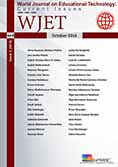The relationship between teachers’ self -efficacy, attitudes towards ict usefulness and students’ science performance in the lebanese inclusive schools
The relationship between teachers’ self -efficacy, attitudes towards ict usefulness and students’ science performance in the lebanese inclusive schools
Author(s): Badrie ELDaou, Sara KazanSubject(s): Education, ICT Information and Communications Technologies, Inclusive Education / Inclusion
Published by: Birlesik Dunya Yenilik Arastirma ve Yayincilik Merkezi
Keywords: Perceived self –efficacy; Information and Communication Technology- ICT;academic performance; Inclusive education;
Summary/Abstract: The current study explores the relationship of the perceived teacher’s self-efficacy related to ICT usefulness and attitudes after training and the students’ science education performance results. Also, this study examines the impact of using technology on the science learning process, the students’ interaction with their teacher and colleagues, their concentration, and participation in the class. To collect data on self-evaluation, this study used qualitative and quantitative methods which helped eleven science teachers to rate their self-efficacy, knowledge, and attitudes. Consequently, measurements of teachers’ attitudes with using computer technology by means of open and closed ended questionnaires and The Computer Technology Integration Survey (CTIS) took place in 2014- 2015 academic year. Also, special needs students’ performance results were collected preand post ICT training. This study identified possible influences on self-efficacy beliefs, perceived usefulness of computer technology, and ratings of self-efficacy beliefs toward technology integration. Findings of this study revealed that teachers’ self-efficacy in the level of technology use, and attitudes have significant effects on the grades and interaction of students with special needs. The results indicated that participants of group one, who were trained, were able to better define and apply technology in the science classroom than group two which was not being trained. The findings suggest that knowledge and beliefs can influence teachers’ intent to use technology in the classroom, especially as evidenced by the integration of ICT in their lesson plans. Moreover, results indicate a significant positive Pearson correlation r=.6 between teachers’ self-efficacy, knowledge,
Journal: World Journal on Educational Technology: Current Issues
- Issue Year: 8/2016
- Issue No: 3
- Page Range: 148-164
- Page Count: 17
- Language: English

